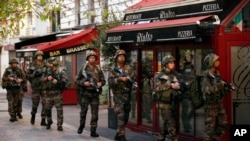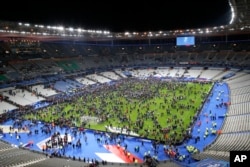As residents of St. Denis, France, recover from a traumatic police raid on terrorists last week, they are quick to point out the two killed were not from their neighborhood.
While some say that this northern suburb of Paris’ biggest asset is its multi-ethnic residents, others say they are frustrated with the continuous struggle faced by some of the youth and insist it needs to be addressed by authorities.
Assiatou Diallo has been living in St. Denis for 23 years.
“You never expect something like this to happen in your neighborhood. It was was a terrible shock for all of us,'" said Diallo.
She says the diversity of the neighborhood is what enriches its residents. “St. Denis is a big city with more than 100,000 people. We have lots of nationalities and we’ve always lived well together. There are mosques and churches, but we’ve always respected each other,” she said.
Like many suburbs, she admits they have problems with youth unemployment and delinquency, but notes it's an issue in many places.
She says the city has made some efforts, but that authorities should definitely focus on finding work for the youth and other ways to improve their lives.
Isabelle Idier is the director of PPV93, a local organization that aims to improve the quality of life for youth and their integration in day-to-day social life. She says what happened last week was traumatic to most people in the neighborhood, especially those who witnessed the St. Denis raid.
Idier says most of her employees are traumatized and haven’t come to work. She says the raid could have happened anywhere because no one is immune.
She says St. Denis is historic because it has a well-known basilica - the burial place of many French kings - and the Stade de France [French stadium]. She says the central neighborhood is very vibrant with people from all corners of the world and economic backgrounds, and that is St. Denis’ biggest asset.
Idier says her organization has been around for 20 years and has three main areas of work: finding jobs and professional development for youth, job skills training to make them more marketable to cities like Paris, which offer more durable jobs than St. Denis, and making sure girls and boys are equally trained.
She also says her organization is getting less from a city that claims to have less money. And with dwindling budgets, companies that used to help are also scaling back, Idier says, making it harder for her company to sustain its programs.
Aliou Goloko is a journalist and the director of Goal Communications company. He says while most people are trying to go on with their lives, the city looks very empty. “Generally the transportation are full, but today you move easily into Paris via train, metro or car because of what happened last week,” he noted.
He says he’s not surprised the raid took place in the St. Denis neighborhood. “We all know that St. Denis is a city with a lot of problems. You have so many people coming from different backgrounds. They are all French, but with foreign backgrounds.”
Goloko says he remembers the riots that took place there and in other areas in 2005. He says the country needs to do something.
“Some of the issues today have to do with the fact that you might not be able to get a job if you have a foreign background and you say you live in St. Denis. So the French authorities have to handle the situation and let everyone know that all the people coming from St. Denis are not terrorists, and they are not bad people," said Goloko.
"They have to show examples of other people who are doing great professionally, musically, culturally, sportively, to show that some people are coming from this area and they are doing great,” he concluded.








